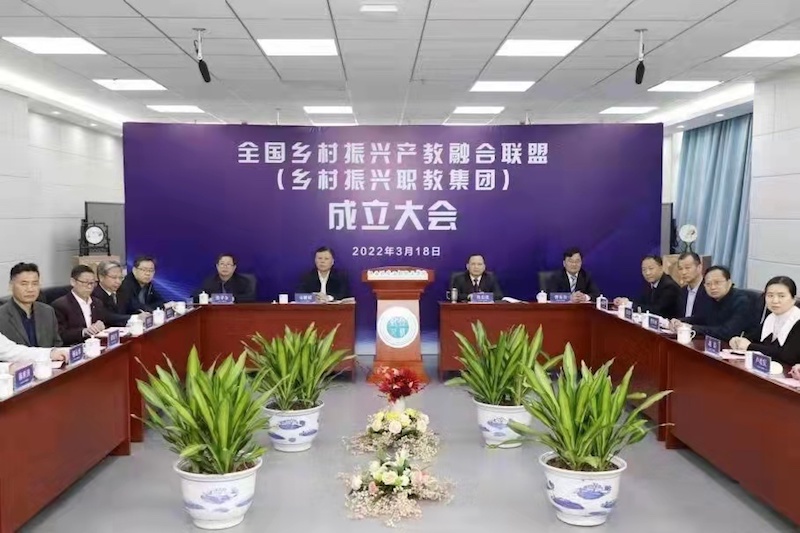

Recently, the inaugural meeting of the National Rural Revitalization Industry-Education Integration Alliance (Rural Revitalization Vocational Education Group) was successfully held. The meeting adopted the online-offline and live broadcast mode, and set up two offline sub-venues in Beijing and Ganzhou, Jiangxi Province. Fang Naichun, Secretary of the Party Group and Director General of China Vocational Education Association, Chu Zhan, Deputy Director of the Price and Cost Investigation Center of the National Development and Reform Commission, Tu Sanguang, Head of the Training Center of the Vocational Education Development Center of the Ministry of Education, Wang Lujiang, President of the China Association for Student Employment, former Party Secretary of Beijing Language and Culture University attended the meeting, and more than 300 people from more than 150 units including Tsinghua University and the Institute of Urban Agriculture, the Chinese Academy of Agricultural Sciences attended the inaugural meeting. SUCC joined the alliance (group) and actively participated in serving the rural revitalization.
At the inaugural meeting, the General Assembly voted to adopt the constitution and organizational structure of the Alliance (Group) and elected the chairman, executive vice chairman, vice chairman and secretary-general of the Alliance (Group), President Ye Yinzhong was elected as an executive vice chairman of the Alliance (Group), and SUCC was the executive vice chairman of the Alliance (Group).
It is reported that the National Rural Revitalization Industry-Education Integration Alliance (Rural Revitalization Vocational Education Group) is under the guidance of the China Vocational Education Society, the National Development and Reform Commission Price and Cost Investigation Center and other units and was jointly initiated by the Promotion Association, the China Association for Student Employment, and Jiangxi Environmental Engineering Vocational College to promote the organic integration of the education chain, industrial chain, talent chain and innovation chain, and serve the national rural revitalization strategy.
The rural revitalization strategy is a major decision and deployment made by the 19th National Congress of the Communist Party of China. It is also a major historical task for building a modern socialist country and s key to our efforts concerning agriculture, rural areas and farmers in the new era. Vocational education, as the type of education most closely related to regional economic and social development, has great promise and great achievements in the process of assisting the rural revitalization strategy. In recent years, SUCC has actively responded to the national rural revitalization strategy, implemented moral cultivation, strengthened practical education, gave full play to the important role of innovative practice and poverty alleviation practice in the cultivation of high-quality talents, and deeply connected with Kashgar in Xinjiang, Zunyi in Guizhou, Yuexi in Anhui, etc., to realize the sharing of rural innovation bases, the co-construction of rural innovation colleges, and the co-education of rural innovation projects, and organically combine the cultivation of innovative and entrepreneurial talents with serving rural revitalization. The establishment of the Rural Revitalization Vocational Education Group is a powerful measure to respond to the national strategic deployment and help rural revitalization. In the future, SUCC will also take the opportunity of joining the alliance (group) to give full play to the school’s demonstration and leadership in the field of rural revitalization and rural talent training across the country. It explores the establishment of new and large platforms for school-enterprise cooperation, integration of production and education, and achievement transformation in the field of rural revitalization, and strengthens the incubation mechanism and service system of the school's characteristic “green innovation, military innovation, and rural innovation” integrated development. Vocational education and talent support capabilities empower and speed up rural revitalization, and contribute to the promotion of high-quality development in the critical stage of the school’s full sprint for undergraduate vocational colleges.